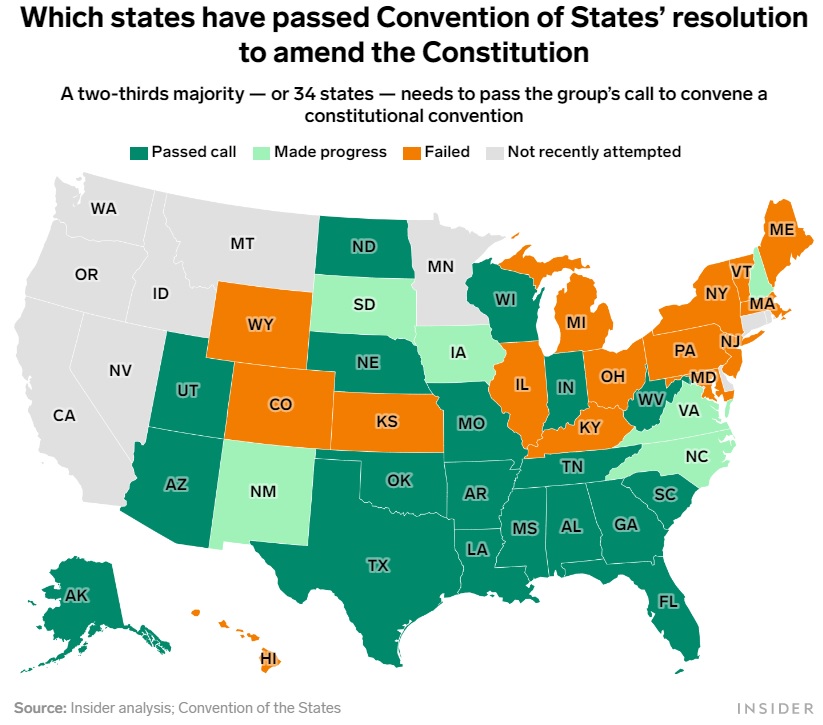Yesterday’s column was about the referendum for a new leftist constitution in Chile.
Fortunately, Chilean voters overwhelmingly rejected that awful plan (a surprisingly positive outcome since those same voters were foolish enough to vote for a leftist president last December).
Today, we’re going to look at potential constitutional changes in the United States. But our focus won’t be on how the Constitution should (or should not) be changed, but rather on the process.
Why? Because there’s a serious effort for a constitutional convention, similar to the meeting back in 1787 (though it’s unclear whether we have people like James Madison and Alexander Hamilton today).
This is something that is allowed by the Constitution, so long as it has support from 34 states. Here’s a map showing what’s happened to date.

The map comes from an article that Grace Panetta and Brent Griffiths wrote for Business Insider.
They have a good description of how the process works.
Article V to the US Constitution provides two ways to amend the nation’s organizing document… The first is for a two-thirds majority of Congress to propose an amendment, with three-fourths of states ratifying it. This is how all 27 of the current amendments to the Constitution were added… The second method — never before accomplished — involves two-thirds of US states to call a convention. …two-thirds of the state legislatures are needed to call a convention and three-fourths must vote to ratify any amendments. …Conservatives and liberals alike say this requirement would doom hyperpartisan or plain loony amendments.
Conservatives are the main proponents of a constitutional convention.
The December 2021 ALEC meeting represents a flashpoint in a movement spearheaded by powerful conservative interests…to alter the nation’s bedrock legal text since 1788. It’s an effort that has largely taken place out of public view. But interviews with a dozen people involved in the constitutional convention movement, along with documents and audio recordings reviewed by Insider, reveal a sprawling, well-funded…and impassioned campaign taking root across multiple states. …Rob Natelson, a constitutional scholar and senior fellow at the Independence Institute who closely studies Article V of the Constitution, predicted to Insider there’s a 50% chance that the United States will witness a constitutional convention in the next five years.
Some folks on the left also like the idea.
The right isn’t alone in pursuing a convention. On the left, Cenk Uygur, a progressive commentator, founded Wolf PAC… Five Democratic states passed Wolf PAC’s call for a campaign finance reform-focused convention: California, New Jersey, Illinois, Vermont, and Rhode Island.
Now the issue is getting more attention.
Writing for the New York Times yesterday, Carl Hulse reports on the campaign for a new constitutional convention.
Elements on the right have for years been waging a quiet but concerted campaign to convene a gathering to consider changes to the Constitution. They hope to take advantage of a never-used aspect of Article V, which says in part that Congress, “on the application of the legislatures of two-thirds of the several states, shall call a convention for proposing amendments.” …backers of the convention idea now hope to harness the power of Republican-controlled state legislatures to…strip away power from Washington and impose new fiscal restraints, at a minimum. …leading proponents of the convention idea come from the right and include representatives of the Tea Party movement, the Federalist Society, grass-roots right-wing activists… And some liberals have welcomed the idea of a convention as a way to modernize the Constitution and win changes in the makeup and power of the Supreme Court, ensure abortion rights, impose campaign finance limits and find ways to approach 21st-century problems such as climate change.
I have two comments regarding this effort.
First, much of the impetus comes from prudent people who are disturbed by the reckless profligacy in Washington. These folks are right to be concerned, but I have been telling them that they need to pursue a spending limit amendment (like the Swiss “Debt Brake” or Article 107 of Hong Kong’s Basic Law) rather than a balanced budget requirement.
Simply stated, spending caps work.
Second, I wonder whether any sort of constitutional change can get the necessary support from 3/4ths of the states. I doubt left-wing states like California, New Jersey, and Illinois would ratify a good amendment to control spending, just like right-wing states like Texas, South Dakota, and Utah presumably would reject a leftist amendment to do something like restrict political speech.
Maybe Colorado’s TABOR can be a role model.



